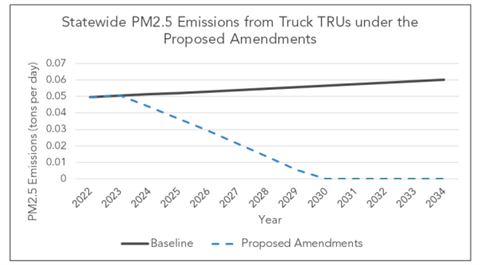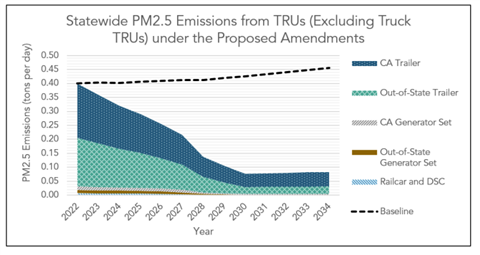CARB takes aim at TRUs
24 February 2022
 The California Air Resources Board is adopting new rules for transport refrigeration units (TRUs). (Photo: CARB)
The California Air Resources Board is adopting new rules for transport refrigeration units (TRUs). (Photo: CARB)
The California Air Resources Board (CARB), which late last year adopted new standards that will ultimately lead to the elimination of small spark-ignited engines 25 hp and under in California, is now taking steps toward zero emissions for another type of engine-powered equipment, transport refrigeration units (TRUs).
The agency has approved amendments to its current rule for TRUs operating in the state. The amendments will require a variety of actions designed to reduce the pollution TRUs produce and accelerate their transition to zero-emission technologies.
Used to cool truck and trailer spaces carrying perishable or goods requiring controlled temperatures, TRUs have historically been one of the highest volume markets for small diesel engines.
 The expected reduction in particulate emissions from truck TRUs under the new rules approved by CARB. (Photo: CARB)
The expected reduction in particulate emissions from truck TRUs under the new rules approved by CARB. (Photo: CARB)
The new requirements, which were initially proposed last year, include the transition of diesel-powered truck TRUs to zero emissions, a new particulate matter emissions standard for newly manufactured non-truck TRU engines used on trailers, domestic shipping containers, railcars and generator sets, the use of lower global warming potential refrigerants, facility registration and reporting, expanded reporting and labeling and new fees.
CARB said the new requirements will help meet the current health-based ambient air quality standards across California build on progress achieved by the existing rule, which requires TRUs operating in California to meet in-use particulate matter performance standards after they turn seven years old.
“These amendments will allow us to protect public health especially in the most overburdened, disadvantaged communities where most of these transport refrigeration units operate,” said CARB Chair Liane Randolph. “Moving forward we expect to see increasing numbers of zero-emission units to continue making progress toward our air quality goals - reducing asthma, cancer risk and providing tangible public health benefits for California residents.”
 The expected particulate emissions from TRUs used in non-truck applications under the new rules approved by CARB. (Photo: CARB)
The expected particulate emissions from TRUs used in non-truck applications under the new rules approved by CARB. (Photo: CARB)
CARB said that TRU emissions still contribute to an increased health risk especially in communities that are already hard hit by air pollution from truck traffic, and where large numbers of these units congregate, such as refrigerated warehouses and distribution centers, grocery stores, seaport facilities, and intermodal railyards.
Key elements of the newly adopted requirements include:
– Beginning Dec. 31, 2022, new truck TRUs, trailer TRUs and domestic shipping container TRUs are required to use a refrigerant with a global warming potential less than or equal to 2200, or no refrigerant at all.
– As of the same date, model year 2023 and newer trailer TRUs, domestic shipping container TRUs, railcar TRUs and TRU generator set engines are required to meet a lower particulate matter emission standard that aligns with the U.S. EPA Tier 4 final off road particulate matter emission standard for 25 to 50 hp engines.
– Beginning Dec. 31, 2023, owners of refrigerated warehouses and distribution centers, grocery stores, seaport facilities and intermodal railyards are required to register with CARB, pay fees every three years, and report all TRUs that operate at their facility. Alternatively they may attest that only compliant TRUs operate at their facility.
– TRU owners will be required to report all TRUs – including those based out-of-state that operate in California – to CARB, pay TRU operating fees and affix CARB compliance labels to their TRU every three years.
Finally, TRU owners will be required to turn over at least 15% of their truck TRU fleet to zero-emissions technology each year for seven years. All truck TRUs operating in California will be required to be zero emissions by Dec. 31, 2029.
More information on the new TRU rule is available here.
STAY CONNECTED




Receive the information you need when you need it through our world-leading magazines, newsletters and daily briefings.
POWER SOURCING GUIDE
The trusted reference and buyer’s guide for 83 years
The original “desktop search engine,” guiding nearly 10,000 users in more than 90 countries it is the primary reference for specifications and details on all the components that go into engine systems.
Visit Now
CONNECT WITH THE TEAM









